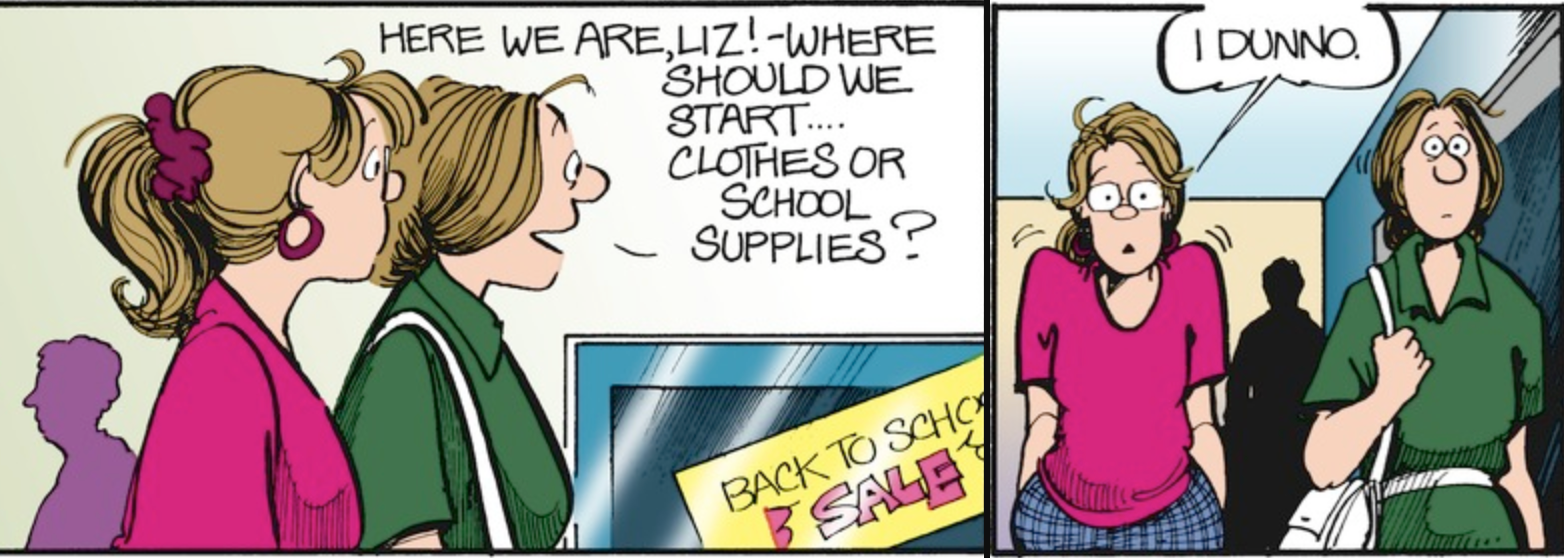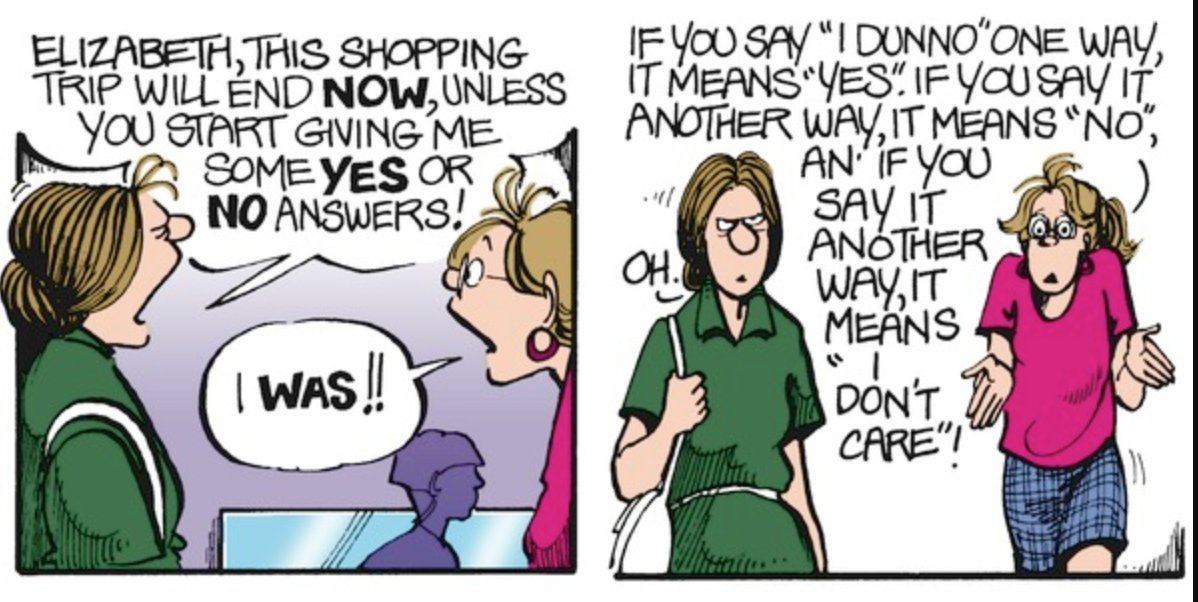I dunno1 or I dunno2 or I dunno3?
« previous post | next post »
And don't forget I dunno4 . . .
Today's For Better or For Worse starts this way:

The pattern continues:

The crisis:
And the resolution:
The (currently) featured comment:
Speaking for myself, I identify with Liz in this exchange. I should be able to give a better answer to the "How do I tell which is which?" question, but I can't. And unfortunately there's no sound track, so those of us interested in the interpretation of prosody are left to speculate, even about our own methods of communication.



Coby said,
August 28, 2022 @ 11:08 am
The subscripts in the title remind me of Korzybski.
David P said,
August 28, 2022 @ 5:22 pm
Korzybski! I'm 70, so I understand this comment. Does anyone still read him?
Brett said,
August 28, 2022 @ 7:14 pm
Does anyone still read For Better or For Worse?
(Seriously, it's been all reruns since 2008. Liz was actually about my age—so old enough to be a grandparent now.)
JPL said,
August 28, 2022 @ 9:13 pm
There was a previous LLog post in the recent past on the intonation contour for the "shrugging" sense of "I don't know", where the contour alone (w/ a final rise) sufficed to express the intended meaning. I would guess that here perhaps the "yes" sense would have a high-falling pitch on "know" (indicating "possibility"), and the "no" sense would have a (low-mid?) level contour and then falling on "know" (indicating "doubt"), and that again the contour alone, without the words, would suffice. In the deadening ennui of the concerns of the parental world, who has the energy for articulation?
AntC said,
August 29, 2022 @ 12:01 am
The final frame No wonder parents don't get along with teenagers … They don't know how to communicate!!
Why is that not "They dunno how to communicate"? Perhaps dunno5.
(Don't) know how is different vs (dun)no that?
Does Liz want to go back to school in just the same clothes as last year? Indecipherable answers to be taken as Yes.
Yesterday's 'Zits' strip seems apposite: Jeremy giving unambiguous feedback to his Mum. (I won't post a link. Because spam.)
Michael Watts said,
August 29, 2022 @ 12:47 am
Because that sentence refers to a failure to know something; it's based around the lexeme "know".
What was once the compositional phrase "I don't know" has been lexicalized into an independent form, variously written "I dunno", "iono" etc. and pronounced anywhere along a continuum from "I dunno" to "uh uh uh". But that's not something that happened to the verb "know" in general.
Michael Watts said,
August 29, 2022 @ 12:53 am
(I would elaborate that, to my mind, it's perfectly acceptable to reduce the beginning of "They don't know how to communicate" to /'ðeɪ.də.noʊ/. But "I don't know" is routinely reduced much, much further than that.
Ben Zimmer said,
August 29, 2022 @ 3:55 pm
JPL: Mark L. had a series of relevant LL posts a year ago: "Dinosaur Intonation" (8/28/2021), "Hummed 'I don't know'" (8/29/2021), and "More 'I don't know'" (8/31/2021).
V said,
August 29, 2022 @ 6:25 pm
I know who Korzybski was, but my only exposure to this notation was in Samuel Delaney's Stars in my Pockets Like Grains of Sand.
Mike Grubb said,
August 30, 2022 @ 8:09 am
@AntC I'd guess that the final "don't know" isn't "dunno" because it's in a thought balloon rather than a speech balloon.
JPL said,
August 30, 2022 @ 4:13 pm
Mike Grubb's comment above and the way he expresses it raises an interesting question.
So, Q for commenters: Do you experience a "thought" like that one as fully articulated with the perceivable "Bloomfieldian forms" as mental (auditory) images, or do you (at least sometimes) experience it as an at least not fully articulated sense that is "done", but that remains mostly "behind the scenes", where you're sort of aware you are having the thought, but not fully articulating (expressing) it to your inner self (and in which case a temporal unfolding may be lacking)? If "Liz" is experiencing the thought in the latter way, then the expressions in the "thought bubble", unlike the speech bubbles, are the words of the cartoonist trying to get at what's going on "behind the scenes", and not Liz's words, since she didn't express it to herself. (The Q is probably applicable to any cartoon thought bubble.)
Michael said,
August 30, 2022 @ 6:50 pm
JPL:
Speaking entirely for myself, I experience nearly all thoughts as fully-formed sentences (and even chide myself for the occasional use of slang in my thinking). I believe this sort of verbal/textual thought-experience to be somewhat rare, based on conversations I've had with others. It wouldn't surprise me to learn that other LLog readers and commenters tend more toward this sort of thinking than does the general population.
Christopher Henrich said,
September 3, 2022 @ 12:07 pm
@ David P
I actually did read Korzybski once, long ago. (Being a math
grad student at the time, I skipped his supposedly improved
exposition of differential and integral calculus.) I also read
Hayakawa & Rapoport, Language in thought and action.
The whole General Semantics movement seemed to me to offer useful criticism of certain fallacies, or a more general fallacious tendency, which I privately label "essentialism": the habit of thinking that the structure of language exactly reflects the structure of reality. For instance, an essentialist thinks that everyone who is called a Communist thinks and acts just like everyone else who is called a Communist.
I felt that this criticism was useful and constructive. However, it is nowhere near as radical, or as earth-shaking, as the General Semanticist seeded to think.